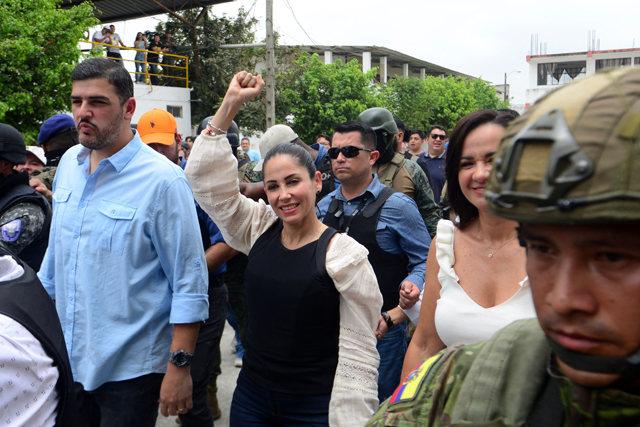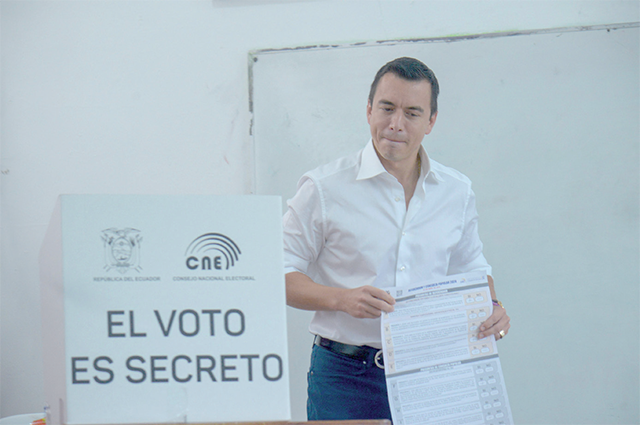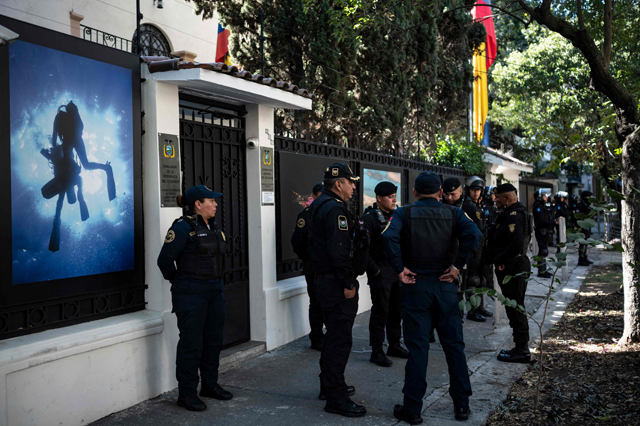You are here
As drug war spirals, Ecuadorans elect a new president
By AFP - Oct 16,2023 - Last updated at Oct 16,2023

Ecuador’s presidential candidate for the Revolucion Ciudadana Party, Luisa Gonzalez (centre), waves while accompanying Guayaquil Mayor Aquiles Alvarez (left) to vote at a polling station in Guayaquil, Ecuador, on Sunday (AFP photo)
QUITO — Voters in Ecuador went to the polls Sunday to choose a new president in the midst of a drug war and a rash of political assassinations that cut short the bid of a popular candidate.
The finalists in this runoff election — lawyer Luisa Gonzalez, 45, and banana empire heir Daniel Noboa, 35 — campaigned in bulletproof vests as a climate of fear grips the once peaceful South American country.
They wore those vests again Sunday as they cast their ballots, under the protection of armed bodyguards. Both have vowed to prioritise dealing with the escalating violence.
Long lines formed outside voting stations as the election unfolded amid a heavy police presence, although there were no immediate reports of violence.
“It is a critical election,” Freddy Escobar, a popular 49-year-old singer, told AFP, citing crime as his main worry. “I am voting in fear.”
Indeed, the main concerns of Ecuadorans, according to recent polls, are crime and violence in a country where the murder rate quadrupled in the four years to 2022. Some 54,000 police have been deployed to keep the vote safe.
The first preliminary results are expected in the early evening, the National Electoral Commission said.
“Today we win,” Noboa shouted as he pumped his fist in the air after voting in the coastal town of Olon, where he lives.
Gonzalez predicted victory as she cast her ballot in the southwest town of Canuto.
“My hunch is that Ecuador will win, in other words, Citizen Revolution,” she said, referring to the name of her party.
Drug violence
Long a haven between major cocaine exporters Colombia and Peru, Ecuador has seen violence explode in recent years as enemy gangs with links to Mexican and Colombian cartels vie for control.
The fighting has seen at least 460 inmates massacred in prisons since February 2021 — many beheaded or burned alive in mass riots.
And the bloodbath has spilled into the streets, with gangs dangling headless corpses from city bridges and detonating car bombs outside police stations in a show of force.
In August, the violence claimed the life of anti-graft and anti-cartel journalist and presidential candidate Fernando Villavicencio, mowed down in a barrage of submachine-gun fire after a campaign speech.
He had been polling in second place.
A state of emergency was declared after Villavicencio’s assassination, and Noboa and Gonzalez both campaigned with heavy security details.
‘Change this country’
Whoever wins Sunday will be elected to only 16 months in office — completing the term of incumbent Guillermo Lasso, who called a snap vote to avoid possible impeachment for alleged embezzlement.
The winner will be allowed to run again for the 2025-29 presidential term, and the one after that.
Both candidates are relative unknowns, and a win for either would make history: Gonzalez becoming Ecuador’s first woman president, or Noboa its youngest.
Gonzalez is the handpicked candidate of socialist ex-president Rafael Correa, who governed from 2007 to 2017 and lives in exile in Belgium to avoid serving an eight-year prison term for graft — another major concern in the country.
Her rival Noboa is the son of one of Ecuador’s richest men, who himself has five failed presidential bids to his name.
Ecuador has a poverty rate of 27 per cent, with a quarter of the population either unemployed or holding down an informal job.
Opinion polls list unemployment as voters’ second concern.
Gonzalez has promised more social spending if she is elected, especially on education and health care, while Noboa has vowed he will ensure “progress for everyone”.
From eight candidates, Gonzalez took the most votes in the first round in August with 34 per cent, followed by Noboa with 23 per cent.
Opinion polls predict a close race Sunday, with a high percentage of undecided voters.
Neither Gonzalez nor Noboa will have the luxury of an absolute majority backing their projects in the legislature, and with only 16 months in office, either would face an uphill battle to push through any reforms.
Voting is compulsory for 13.4 million eligible voters in the country of 16.9 million.
Related Articles
QUITO — Ecuador’s President Daniel Noboa claimed Tuesday there had been “irregularities” in a first-round election in which he took a razor-
QUITO — Ecuadorans vote in a referendum Sunday on proposed tougher measures to fight gang-related crime as the country grapples with a shock
QUITO — Ecuador was lambasted across Latin America on Saturday after its security forces stormed the Mexican embassy in Quito to arrest graf













